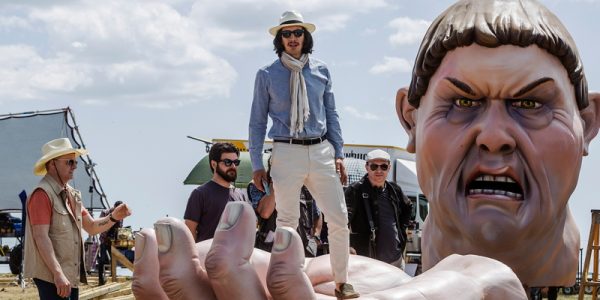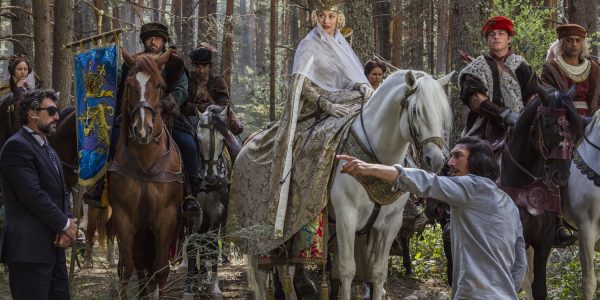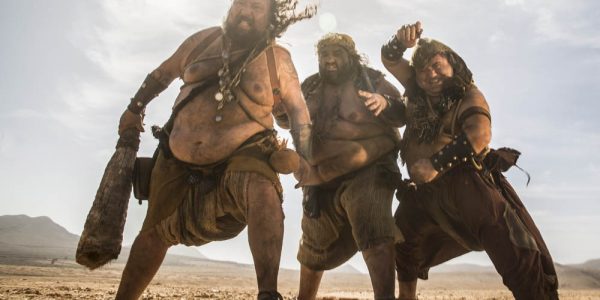The Man Who Killed Don Quixote Review
"Was it worth the wait? "
'Inside every Sancho Panza there's a Don Quixote struggling to get out.' - P. J. O'Rourke
Terry Gilliam is a name that has become synonymous with cult classics in the film industry and is known for butting heads with producers. His quirky and unique creations,
Monty Python and the Holy Grail, Brazil and
Twelve Monkeys, are regularly screened at film festivals around the world. Even with this celebrated body of work to his credit, none has garnered more attention than his ill-fated passion project,
The Man Who Killed Don Quixote. With the cast and storyline changing significantly through the years of production hell, this peculiar tale of an old shoemaker turned legend of literature finally makes its way to screen. Was it worth the all of the pain and effort?

Outside of a small Spanish village, Toby Grisoni (Adam Driver) is overseeing a less than inspiring film project, but the brilliant advertising executive has lost his focus. One day he chooses to escape the pressure of the set and rides a motorcycle into the nearby township. Upon arrival he realizes that this was the community where he had started his career in film with a little-known movie based on the fabled Don Quixote. The repercussions of his film project led many in the village to make irreversible life decisions that had a ripple effect throughout the community.
What ensues is the young executive attempting to balance his responsibilities with the film production as well as making amends for the impact his former project had on the village. Throughout this balancing act, he must confront the delusions brought on by reacquainting himself with the former lead actor, Don Quixote played by Jonathan Pryce. The old shoemaker believes he is the literary figure and immediately sees Toby as his faithful sidekick, Sancho Panza. As the young man tries to make sense of what has happened to the people of this small community, his real life begins to meld with the imagined world of knights and giants.

For all who voluntarily come to a Terry Gilliam film, they should expect the most unusual forms of movie making on the planet. Then to experience a production that has been gestating over two decades, audiences need to know that much of the best of this film was seen in the documentary,
Lost in La Mancha. Adam Driver and Jonathan Pryce attempt to do all they can to salvage something from this convoluted concept and script. Pryce does manage to immerse himself in his character effectively, but the script cannot support his captivating performance.
The writing attempts to maintain three different storylines that never manage to effectively converge. The most compelling element was the back story of the small village, but when the script attempts to connect this endearing character development with the convoluted time-travel and the harsh realities of the modern day filming it falls in on itself. Proving that over the years this project contained enough content to fill three different films, but not enough for one good movie. The bizarre Gilliam touch of fantasy tries to lift this film into the mystical side of this director’s past creations, but all that the giants and time travel manage to do is deliver audience confusion and very few laughs. Unlike many of Gilliam’s classics, this film spirals from a mess into an unrecognizable disaster.

With decades of anticipation, there was an underlying hope that
The Man Who Killed Don Quixote would prove to be a great conclusion to Terry Gilliam’s career. Even though it will provide film courses great material for how not to make films, this surely is not the dream that the
Twelve Monkeys director thought it would become. Unfortunately, this extended nightmare of the long-suffering director proves that when the film equipment was washed away years ago, the crew should have gone home and left this production behind in the gullies of Spain.
Pros
- There is a whisper of the director's dream in amongst this production
- Johnathan Pryce and Adam Driver give all they can to their performances
Cons
- Convoluted storylines
- Difficult to know where each story impacted the other
- The cast even seems confused by where everything is going
 Outside of a small Spanish village, Toby Grisoni (Adam Driver) is overseeing a less than inspiring film project, but the brilliant advertising executive has lost his focus. One day he chooses to escape the pressure of the set and rides a motorcycle into the nearby township. Upon arrival he realizes that this was the community where he had started his career in film with a little-known movie based on the fabled Don Quixote. The repercussions of his film project led many in the village to make irreversible life decisions that had a ripple effect throughout the community.
What ensues is the young executive attempting to balance his responsibilities with the film production as well as making amends for the impact his former project had on the village. Throughout this balancing act, he must confront the delusions brought on by reacquainting himself with the former lead actor, Don Quixote played by Jonathan Pryce. The old shoemaker believes he is the literary figure and immediately sees Toby as his faithful sidekick, Sancho Panza. As the young man tries to make sense of what has happened to the people of this small community, his real life begins to meld with the imagined world of knights and giants.
Outside of a small Spanish village, Toby Grisoni (Adam Driver) is overseeing a less than inspiring film project, but the brilliant advertising executive has lost his focus. One day he chooses to escape the pressure of the set and rides a motorcycle into the nearby township. Upon arrival he realizes that this was the community where he had started his career in film with a little-known movie based on the fabled Don Quixote. The repercussions of his film project led many in the village to make irreversible life decisions that had a ripple effect throughout the community.
What ensues is the young executive attempting to balance his responsibilities with the film production as well as making amends for the impact his former project had on the village. Throughout this balancing act, he must confront the delusions brought on by reacquainting himself with the former lead actor, Don Quixote played by Jonathan Pryce. The old shoemaker believes he is the literary figure and immediately sees Toby as his faithful sidekick, Sancho Panza. As the young man tries to make sense of what has happened to the people of this small community, his real life begins to meld with the imagined world of knights and giants.
 For all who voluntarily come to a Terry Gilliam film, they should expect the most unusual forms of movie making on the planet. Then to experience a production that has been gestating over two decades, audiences need to know that much of the best of this film was seen in the documentary, Lost in La Mancha. Adam Driver and Jonathan Pryce attempt to do all they can to salvage something from this convoluted concept and script. Pryce does manage to immerse himself in his character effectively, but the script cannot support his captivating performance.
The writing attempts to maintain three different storylines that never manage to effectively converge. The most compelling element was the back story of the small village, but when the script attempts to connect this endearing character development with the convoluted time-travel and the harsh realities of the modern day filming it falls in on itself. Proving that over the years this project contained enough content to fill three different films, but not enough for one good movie. The bizarre Gilliam touch of fantasy tries to lift this film into the mystical side of this director’s past creations, but all that the giants and time travel manage to do is deliver audience confusion and very few laughs. Unlike many of Gilliam’s classics, this film spirals from a mess into an unrecognizable disaster.
For all who voluntarily come to a Terry Gilliam film, they should expect the most unusual forms of movie making on the planet. Then to experience a production that has been gestating over two decades, audiences need to know that much of the best of this film was seen in the documentary, Lost in La Mancha. Adam Driver and Jonathan Pryce attempt to do all they can to salvage something from this convoluted concept and script. Pryce does manage to immerse himself in his character effectively, but the script cannot support his captivating performance.
The writing attempts to maintain three different storylines that never manage to effectively converge. The most compelling element was the back story of the small village, but when the script attempts to connect this endearing character development with the convoluted time-travel and the harsh realities of the modern day filming it falls in on itself. Proving that over the years this project contained enough content to fill three different films, but not enough for one good movie. The bizarre Gilliam touch of fantasy tries to lift this film into the mystical side of this director’s past creations, but all that the giants and time travel manage to do is deliver audience confusion and very few laughs. Unlike many of Gilliam’s classics, this film spirals from a mess into an unrecognizable disaster.
 With decades of anticipation, there was an underlying hope that The Man Who Killed Don Quixote would prove to be a great conclusion to Terry Gilliam’s career. Even though it will provide film courses great material for how not to make films, this surely is not the dream that the Twelve Monkeys director thought it would become. Unfortunately, this extended nightmare of the long-suffering director proves that when the film equipment was washed away years ago, the crew should have gone home and left this production behind in the gullies of Spain.
With decades of anticipation, there was an underlying hope that The Man Who Killed Don Quixote would prove to be a great conclusion to Terry Gilliam’s career. Even though it will provide film courses great material for how not to make films, this surely is not the dream that the Twelve Monkeys director thought it would become. Unfortunately, this extended nightmare of the long-suffering director proves that when the film equipment was washed away years ago, the crew should have gone home and left this production behind in the gullies of Spain.